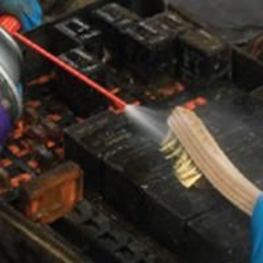While the contact surfaces of connectors are metal, they are often housed in plastic, and rubber gaskets to seal everything from the outside environment. If the solvent used in a contact cleaner is incompatible with the plastic, it can craze (create small cracks), embrittle, or soften the material. Rubber seals may swell, shrink or even dissolve if exposed to a harsh solvent.
Rigid plastics like ABS, polycarbonate (trade name Lexan), and acrylic materials like Plexiglass can be very sensitive to harsh solvents like toluene, xylene, and acetone. Alcohol and hydrocarbon based solvents tend to be better on sensitive plastics. Rubber, silicone or other seals or gaskets made of elastomeric (soft) materials can have a tendency to swell or shrink with exposure to harsh solvents. After the solvent flashes off, they may spring back to their original dimensions, or be permanently changed, impacting the effectiveness of the seal. Polyester or Teflon based gasketing materials are less prone to this type of damage from harsh solvents. A new contact cleaner should always be tested before use on any questionable applications, using any live (and expensive) equipment.
Should I worry about plastic connectors and components and rubber seals when contact cleaning?
You did not finish submitting your information to request a sample







